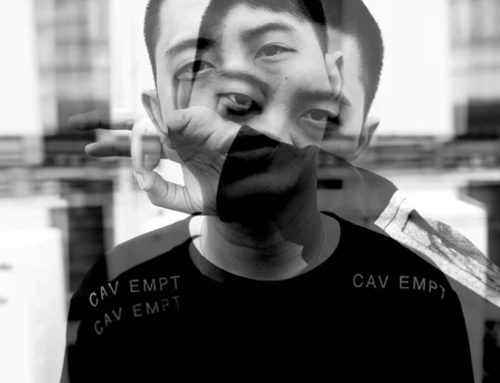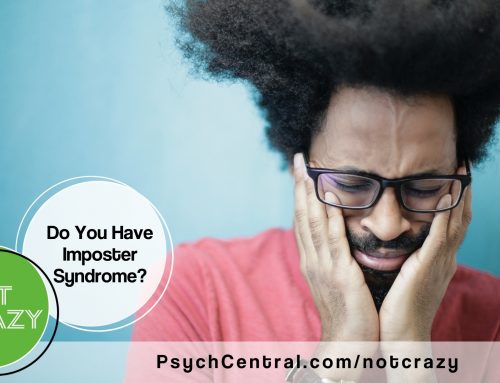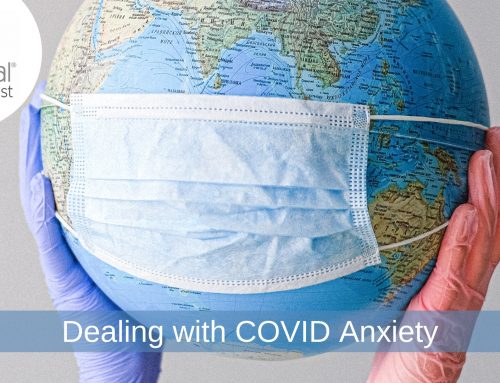Are you in pain, or are you depressed? Does one lead to the other? In today’s show, Dr. Jack Stern, a board-certified neurosurgeon, explains how the two are linked. He also discusses why opioids don’t work for chronic pain and how past pain can affect our current pain levels. Don’t miss a great discussion on the intricate link between physical pain and mental health. Click on the player below to listen now!
SUBSCRIBE & REVIEW
Guest information for ‘Pain Linked to Mental Illness’ Podcast Episode

Jack Stern, M.D., Ph.D., is the author of Ending Back Pain: 5 Powerful Steps to Diagnose, Understand, and Treat Your Ailing Back. He is a board-certified neurosurgeon specializing in spinal surgery, and cofounder of Spine Options, one of America’s first facilities committed to nonsurgical care of back and neck pain. Dr. Stern is on the clinical faculty at Weill Cornell Medical College and has published numerous peer- and non peer– reviewed medical articles. He lives and practices in White Plains, New York. For more information, please visit https://drjackstern.com/
Computer Generated Transcript for ‘Pain Linked to Mental Illness’ Episode
Editor’s Note: Please be mindful that this transcript has been computer generated and therefore may contain inaccuracies and grammar errors. Thank you.
Announcer: You’re listening to the Psych Central Podcast, where guest experts in the field of psychology and mental health share thought-provoking information using plain, everyday language. Here’s your host, Gabe Howard.
Gabe Howard: Welcome to this week’s episode of the Psych Central Podcast. Calling into the show today, we have Jack Stern, MD, PhD, who is the author of Ending Back Pain: Five Powerful Steps to Diagnose, Understand and Treat Your Ailing Back. He is a board certified neurosurgeon specializing in spinal surgery and co-founder of Spine Options, one of America’s first facilities committing to non-surgical care of back and neck pain. Dr. Stern, welcome to the show.
Dr. Jack Stern: Thank you.
Gabe Howard: Well, I’m really glad to have you, and I’m really excited. But before we get started, our longtime listeners are thinking, wait, you know, back pain, an expert in spinal surgery, spine options, neck. What does this have to do with mental health? Dr. Stern, what does this have to do with mental health?
Dr. Jack Stern: Probably a very appropriate question. All of us have been in pain at some point or another, stub your toe, hurt your back. Break a leg. And you know that it’s not just the pain that bothers you, but a variety of other emotions play a role, upset, sadness, depression. It runs the gamut. I get depressed when I have a cold and I can’t work. I just get so upset with myself that I got things to do and I can’t do them. And that’s just from having a cold. Could you imagine if I had something really the matter with me? Thank God. How I would feel. And that’s what I experience in my patients who come to me with rather significant issues related to their spine. And because without dealing with the emotional aspect, the psychological aspects of pain, you really cannot treat pain.
Gabe Howard: Dr. Stern, it sounds like you really think that mental health and physical health shouldn’t be separate. I’ve often said I don’t understand. Whose bright idea it was to decide that these were two separate things, since it’s all one person. Is that how you feel? Am I. Am I putting words in your mouth or have I nailed it?
Dr. Jack Stern: I think that’s absolutely right. Actually, I think that the concept of separating the two. I think that concept is really going away. I think most physicians and I mean probably even your internist. At least my internist, who is not a youngster, always asks me, well, Jack, how are things going? And he doesn’t mean, am I still on the treadmill and do I have intestinal problems? He’s asking me, how are things going? Emotionally. Are you feeling well emotionally? Are you sleeping well? How is your relationship with your children and with your job? And what kind of feelings does that bring up for you? So I think anyone who separates the physical and the emotional I think has missed the boat. And it’s clear, as someone who’s taught in medical schools for 30 years that we no longer make that distinction. Thank goodness. So I think that’s an old concept. And I feel that the two are intimately connected and can’t be separated, at least not easily.
Gabe Howard: That is wonderful news. Let’s move on to your book and your area of expertise. And my first question is, what is the anatomy of pain? Can you talk about that a little bit? I was trying to read about it and learn about it. And I have to admit, it was it was well over my head. But it was also fascinating because all of us have been in pain at some point. Like you said, whether it’s stubbing AHTO or, of course, something as serious as a spinal injury.
Dr. Jack Stern: So there are actually without and I don’t want to get too technical. There are actually two ways that the periphery. That means your body tells your brain that you’re having pain. And there are actually two separate pathways. If you think of the spinal cord as a big cable that connects to the central relay station, which is your brain, they’re actually separate cables for two types of pain. And once I describe it, you’ll probably recognize it. The first type of pain is what we call acute pain. That’s the pain where someone breaks their leg or stubs their toe. Where you go, oh, oh, wow. You really feel acute pain. But there’s also a separate pathway, a separate group of fibers that go up to a relay station. Your brain that are actually there in terms of evolution are actually there before the sharp pain. And those fibers, that pathway sends messages of what we call deep, gnawing pain. It’s like, oh, I got something in my belly. Just feels, you know, it’s, it’s just uncomfortable. It’s or my back just, it’s not killing me. It’s not like I can’t walk, but it hurts all the time. It’s that deep gnawing pain. So those two pathways exist in the body that has a lot of importance, both psychologically and physically, because the two pathways have a different what we call neurotransmitters, and those are the chemicals that send the messages to the brain.
Dr. Jack Stern: So, for example, if someone has that deep gnawing pain and you give them an opiate, they probably will not respond because those pathways don’t recognize opiates, whereas the pathways that transmit messages of acute pain do have what we call opiate receptors and they are effective. So if you break a leg and the doctor gives you one of the narcotic analgesics, it will be effective. But usually not if you have chronic low back pain. And fortunately, part of the and I’ll just digress here a minute. Part of the opiate epidemic is because opiates have been giving for conditions that deal with chronic pain, not the acute pain that responds. So the anatomical pathways are complex. But the important point here is that there are two separate pathways, one for acute pain and one for chronic pain. And certainly the greatest psychological issues arise when patients are in chronic pain. Someone who comes into my office and says I’ve had back pain for six weeks, eight weeks a year, and it doesn’t get any better. And those are the folks that really suffer psychologically.
Gabe Howard: It sounds like what you’re describing should work the same for everybody, but we all know that it doesn’t work the same for everybody. And part of that is, is our psychological response. I think of me and my brother when my brother gets hurt, he’s like supercharges. He’s like, yeah. Feel the burn. When I get hurt, I’m in a corner, almost traumatized. And I’m not really exaggerating. I just have a very low pain tolerance. What is the psychological response to pain on the human body and why does it differ from person to person?
Dr. Jack Stern: I think that to answer that, we could break it up into two parts. One, there are real reasons, intrinsic or innate to your anatomy, where you have more receptors that sense pain and send more pain messages to your brain, and therefore your brother will feel the pain less and you will feel the pain more because you have more receptors. And we see that all the time. You hurt your toe, stub your finger and the other person stubs theirs and they’ll feel it because you have more receptors than they do. But from a psychological point of view, there’s clearly an indication that I’m wondering whether you had an experience once where you were in pain and it could have been when you were very young. And that memory is embedded in your brain. And that memory of that pain, even when we were very young, now raises its awareness and subconsciously your body says, oh, I had that sense of pain so long ago. I don’t want to endure that pain again. I don’t want to experience that pain again. So subconsciously, reliving that experience is something that I think that we all do. And how that experience, previous experience impacted what we’re doing now reflects on how we’re going to relate to the pain psychologically. Does that answer your question?
Gabe Howard: It does. It makes perfect sense. As much as it makes perfect sense from my standpoint, and that kind of leads me to my next question. From your standpoint, you need actual data. So you need to measure pain. But the only thing that I’ve ever seen that measures pain is that, you know, smiley face all the way to a sad face chart that nurses have handed me. And that seems rather ridiculous because as you pointed out, pain is different for everybody. Pain is very personal and there’s a psychological point to pain. I guess my actual question then is, can pain actually be measured?
Dr. Jack Stern: It can be measured, but it’s much too difficult to measure it on a regular basis. So what we do in the hospital is use this device of the smiley face to the frowning face to give us some indication of where the patient’s pain is. But as I think you were alluding to, it doesn’t give us an indication of what the psychological parameters are that are involved in that patient’s pain. I’ll give you an example. A woman can have a very difficult delivery and it could be painful. And this has been shown. This is not me guessing. And then they, maybe a few hours later, and because she had this very healthy baby, they almost always have a smiley face. And the idea that they were in pain during the labor seems to be suppressed. So what I’m saying is that there’s a real complexity to how you experience pain. And some of it has to do with your previous experience with pain.
Gabe Howard: It’s interesting that you say that some of it has to do with your previous experience of pain, because it sounds to me like if you have something really traumatic, let’s go with the broken leg. So I break my leg. Now I’m all 100 percent fine. It’s now a couple of years later and something lesser happens.
Dr. Jack Stern: Yeah.
Gabe Howard: You bang into a table and of course, that hurts. You know, banging your shin into a table is a painful thing. Are you saying that because of the pain that I experienced with the broken leg, that that’s going to psychologically influence the pain I experience in the lesser banging my shin?
Dr. Jack Stern: Invariably. Invariably, because there’s gonna be a fear factor, there’s gonna be an avoidance factor. There’s gonna be a memory of the previous pain. There’s gonna be a wish that this second injury isn’t severe. All those things come into play. I’d also point out that where you are psychologically, when you have either the first or especially the second injury in this case will affect your reaction to the pain. It’s clear that individuals who are depressed will experience the pain or relate that the pain is more severe than someone who is not depressed. And that goes across pretty much across the board. And you’ve seen you’ve probably met someone who’s depressed and the slightest thing bothers them. And they say, oh, that hurts. Oh, that. Oh, my. Oh, there’s this hurts, oh, that hurts. It’s because depression really magnifies. And that’s a great example of how the psychological affects the physical. For example, there was a really good study that showed that a significant number of men and women who have chronic pain, that is pain that lasts longer than it normally should for the same type of accident. A significant percentage of those individuals at some point in their lives were abused physically or emotionally abused. And the pain then evokes that previous abuse. We also know that pain frequently provides the individual with secondary gain. Sweetheart, my back hurts, so could you take out the garbage? Whereas, you know, you probably take out the garbage, but the individual is using it for secondary gain, for not doing what what’s been asked of them. And I see that all the time when it comes to intimacy, where couples one member does you know, I really can’t participate in any intimate activity because my back hurts. So it has tremendous, tremendous psychological overlay in any type of pain we talk about, particularly if the pain lasts for any length of time.
Gabe Howard: Stick around. We’ll be right back after these messages from our sponsors.
Sponsor Message: This episode is sponsored by BetterHelp.com. Secure, convenient, and affordable online counseling. Our counselors are licensed, accredited professionals. Anything you share is confidential. Schedule secure video or phone sessions, plus chat and text with your therapist whenever you feel it’s needed. A month of online therapy often costs less than a single traditional face to face session. Go to BetterHelp.com/PsychCentral and experience seven days of free therapy to see if online counseling is right for you. BetterHelp.com/PsychCentral.
Gabe Howard: We’re back discussing the psychological effects of pain with Dr. Jack Stern. One of the things that this is kind of reminding me of is I suffer from anxiety disorder and I’ve had panic attacks and panic attacks are they’re awful. And anyone who’s suffered from one can agree with it. But one of the things that I noticed is my fear of having another panic attack was very limiting to me. There were places that I wouldn’t go, things that I wouldn’t do. And I had to work all that in therapy. It sounds like pain sort of follows the same kind of thing. Right. I’m so afraid of it hurting or being hurt that I’m skipping out on things. In your example, you said, you know, intimate activity with your partner because you’re afraid that it might hurt your back. Is that analogous?
Dr. Jack Stern: I think so, I think. Absolutely. I mean, you’re not having a panic attack, but you’re concerned that you may have a panic attack. So there’s an aversion reaction that may or may not be real and it may not be real at all because you may be able to do that whatever it is, without getting a panic attack. So I may be a patient who has low back pain, and I don’t want to maybe intelligently don’t want to live that, even though I probably could, because I may injure myself and recreate my back pain. But as I said, there’s some folks who use that psychologically. They probably could lift it but don’t want to because they just want to be nice that day. So once again, the variability is significant.
Gabe Howard: Staying with a panic attack analogy, the way that I got over it is by going to therapy. I spoke with my therapist. I shared my fears about having a panic attack. We worked on coping skills. We talked about why I was afraid of it. Is that the same treatment for folks who concerned about re-injury or pain, who are avoiding pleasurable activities in life because they’re afraid of re-injury or experiencing pain?
Dr. Jack Stern: I think that is a near perfect analogy. Yes. And, of course, I’m not I’m not a therapist. So for me, when I see a patient who has that fear of pain, fear of surgery, first of all, I won’t operate on someone like that. And number two, I will almost always ask the individual to get therapy and refer them to a therapist who specializes. And we have several such in this community who specialize in pain issues. And they will use a variety of techniques to help the individual deal with the pain. And as in your case, it sounds like a find out what the original pain episode was or panic episode was so they can deal with that initial episode and then try to prevent it from stymieing their activities again. So, yes, I think your analogy is a very good one.
Gabe Howard: Dr. Stern, I really appreciate you connecting mental health and physical health, and I’m very glad to hear that things are changing in the way that medicine is practiced. Because I’m only 43 years old. In the grand scheme, I’m not that old. But I remember in the 80s being afraid of surgery and just being told, you know, buck up, it’s not going to be so bad. Don’t you trust the doctors? It’s going to be okay. And then after the surgery, even though, you know, it was scary, it was just scary. People were like, well, the worst is over. I would always hear that phrase, well, the worst is over. This is the worst it’s going to be. You’ll be fine. It wasn’t until I had a mental health problem and I started treating both that I realized that there’s just so much interplay between our emotions about, in this case, pain and the actual pain and treating. Both is our fastest way to wellness. So, kudos,
Dr. Jack Stern: Yeah,
Gabe Howard: I love
Dr. Jack Stern: Yeah.
Gabe Howard: What you’re talking about here.
Dr. Jack Stern: Yeah, absolutely. I don’t know how you can separate it out, and once again, I relate to my own experiences about the whole world seems dark to me if one of my kids isn’t doing well. And everything, every negative aspect of my life suddenly seems to be amplified. And that’s both physical and mental. There’s also a phenomenon that I think is overlooked many times, and that is individuals who have pain, particularly chronic pain. Let me say two things. One, they for whatever reason, whether it’s actually physical or emotional, can function at the level that they could function before the onset of the pain. And I believe that many such individuals and I think this is also part of regular aging, we mourn for lost body parts. So we’re still alive, but we realize that we are not who we were because part of us and I don’t mean to be too dramatic here, but part of us has died. We can’t do that anymore. And we mourn the fact that we can’t do that. And I think that has significant psychological overlay, depression, maybe anger, et cetera. And I see that all the time in individuals. And I see it in myself in terms of I just came from the gym and I realized every time I go to the gym that I can’t do things that I did 10 and 20 years ago. And it really upsets me. And I’m a little depressed about it. And I see these young folks and I wish I were could do that again. But so that’s one. And that’s the loss of body parts.
Dr. Jack Stern: Number two, the big elephant in the room with patients or individuals who have chronic pain is the psychological effect it has on everyone else in their lives, how it affects their spouses, how it affects their children. Oh, Daddy, can’t you play with me? No, my back hurts. You know, my daddy never plays ball with me because his back always hurts. Everybody else’s daddy was always out there playing with them. So imagine the impact that that has on the child, not even on the individual who had the back pain. So this can be in a familial sense and a family could have tremendous psychological impact, senses of rejection, senses of less worthiness, a sense of anger that my dad was never there for me when he when everybody else’s dad was there. So these are the things we don’t talk about. These are the things that get swept under the rug until someone decides, you know, I’m going to have to deal with my pain. And what the impact of my pain had psychologically on those around me and frequently how the others, spouses, children, fellow employees, but mostly family members eventually go into therapy and say, why am I so upset with my father? I understand why he was never there for me. He was always complaining of back pain or it’s the same as if my dad wasn’t there because he was always working. But this is a cloud that hangs over families when there’s an individual who has back pain. It’s what I call the psychological unspoken of psychological cloud of back pain.
Gabe Howard: And Dr. Stern, you have a whole chapter in your book dedicated to the psychology of pain and especially for our listeners. That’s very important to understand. And the book is called Ending Back Pain: Five Powerful Steps to Diagnose, Understand, and Treat Your Ailing Back. Where can they find it and where can they find you?
Dr. Jack Stern: So the book is obviously on Amazon and most Barnes & Noble, most bookstores. But if you’re like me, you buy everything on Amazon. That’s why he became the world’s richest person.
Gabe Howard: Very true.
Dr. Jack Stern: My wife says, there’s another box for you from Jeff Bezos waiting at the door. So. And you can find me. Actually, my Web site is called very simply, DrJackStern.com. And I actually have a place on that Web site where people can actually consult with me if they’re having back pain. And we take their histories. We even have them send us their MRI or CAT scans. And I then communicate with them to see if I can share with them my years of experience. So that’s also a possibility. DrJackStern.com.
Gabe Howard: Wonderful. Thank you so much for being here. I really appreciate it. I can’t thank you enough.
Dr. Jack Stern: Thank you, it was really interesting speaking to you.
Gabe Howard: Wonderful. And listen up, listeners, here’s what I need you to do. Wherever you download this podcast, please rate us however you feel is appropriate. But take the extra step. I would consider it a personal favor if you would use your words and tell people what you like about the podcast. Obviously, subscribe to our show, share us on social media. Email a friend. Hey, it’s a good excuse to talk to your mom. And remember, we have a private Facebook group at PsychCentral.com/FBShow. And as always, support our sponsor. You can get one week of free, convenient, affordable, private online counseling anytime, anywhere, simply by visiting BetterHelp.com/PsychCentral. And we will see everybody next week.
Announcer: You’ve been listening to The Psych Central Podcast. Want your audience to be wowed at your next event? Feature an appearance and LIVE RECORDING of the Psych Central Podcast right from your stage! For more details, or to book an event, please email us at show@psychcentral.com. Previous episodes can be found at PsychCentral.com/Show or on your favorite podcast player. Psych Central is the internet’s oldest and largest independent mental health website run by mental health professionals. Overseen by Dr. John Grohol, Psych Central offers trusted resources and quizzes to help answer your questions about mental health, personality, psychotherapy, and more. Please visit us today at PsychCentral.com. To learn more about our host, Gabe Howard, please visit his website at gabehoward.com. Thank you for listening and please share with your friends, family, and followers.
This article originally appeared on Psych Central as Podcast: Is There a Link Between Physical and Mental Health?













